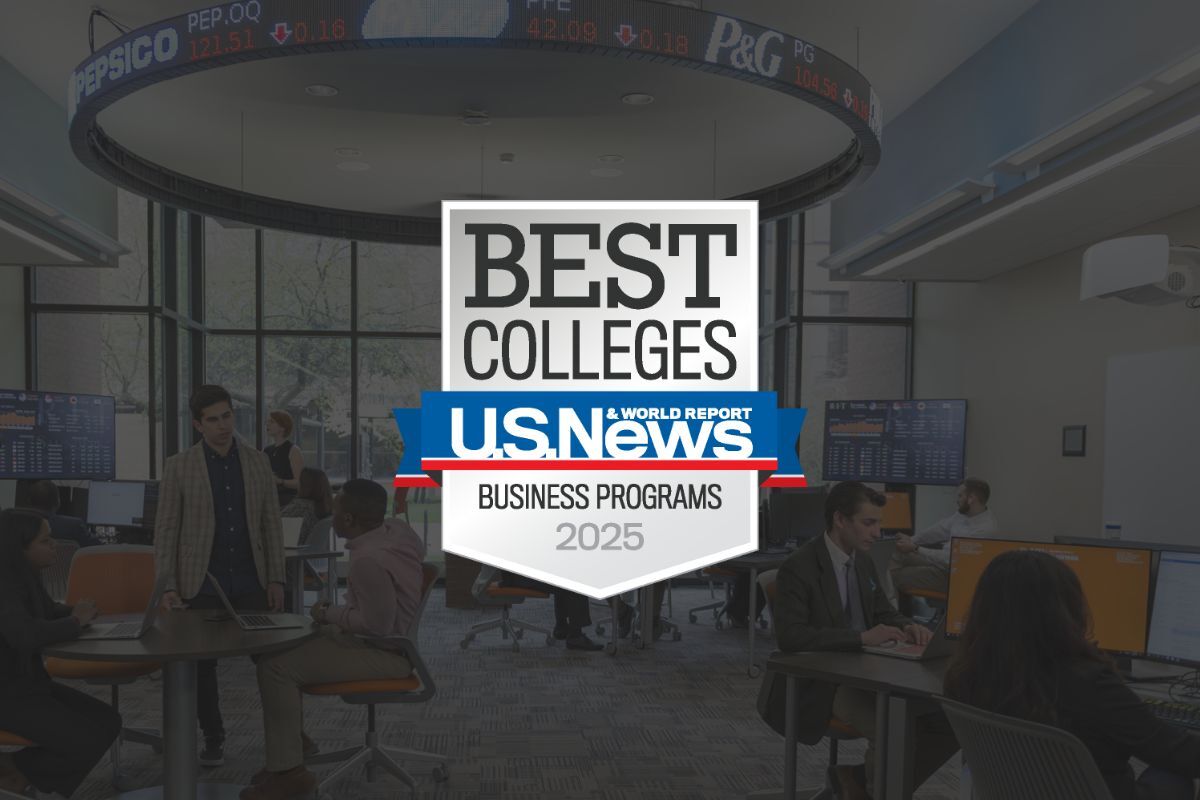Finance Bachelor of Science Degree

Finance
Bachelor of Science Degree
- RIT /
- Saunders College of Business /
- Academics /
- Finance BS
RIT's finance bachelor's degree involves the management, creation, and study of money, banking, investments, assets, and liabilities.
$70.7K
Average First-Year Salary of RIT Graduates from this degree
#1
Undergraduate business programs in Western New York; 67th overall nationally. U.S. News & World Report, 2021
$180K+
Value of an investment portfolio managed by students in the Financial Management Association
Overview for Finance BS
Why Study a Finance Bachelor's Degree at RIT
Become an expert in cash-flow analysis, capital markets, financial decision-making, or forecasting.
Stay up-to-date with financial trends by learning big data and data analytics in the Sklarsky Center for Business Analytics, a state-of-the-art facility housing Bloomberg Financial Markets technology.
Connect with Saunders alumni and key professionals through the Finance Advisory Board.
Gain relevant, hands-on experience through an immersive, applied curriculum in the classroom and a full-time, paid co-op experience.
Explore the management, creation, and study of money, banking, investments, assets, and liabilities, and the impact of technology on financial systems, cash-flow analysis, capital markets, financial decision-making, and forecasting. This is the exciting world of finance.
What is Finance?
Finance is more than tracking a budget. It is the art and science of managing cash flows, risk, and ultimately, value. Finance functions include corporate finance, budgeting, investment management, risk management, and valuation. Financial expertise determines the optimal management of money and the generation of value for clients.
RIT's Finance Bachelor's Degree
The world's financial markets are globally integrated. As a result, you need a finance degree that prepares you with a global understanding of financial markets, how they are integrated, and how they impact the business world.
In RIT's finance major, you'll learn about the management, creation, and study of money, banking, investments, assets, and liabilities. You'll become familiar with financial systems, which include the public, private, and government spaces, and have the opportunity to become an expert in cash-flow analysis, capital markets, financial decision-making, or forecasting. Set yourself a part with a finance degree that:
- Emphasizes the use of Big Data: You'll gain the data analytics skills to manage and analyze an organization's data to understand and forecast financial trends.
- Provides unparalleled access to technology: The state-of-the-art Sklarsky Center for Business Analytics features 12 Bloomberg terminals that connect you to Bloomberg technologies that track corporate financial data in real-time.
- Enables you to manage a real investment portfolio: In the student chapter of the Financial Management Association you'll actively manage a real $250,000+ portfolio.
- Prepares you to today's finance careers: Graduates are analytics-driven and skilled in making keen decisions by evaluating historical data and market performance forecasts.
Finance Curriculum
The finance major includes foundational courses in accounting, management, business planning, financial management, organizational behavior, and more. In addition, the financial curriculum includes advanced courses in investments, financial analysis, and strategic management. Finance electives enable you to select courses for more in-depth study in areas such as options and futures, business law, financing new ventures, financial analytics, and more. You will also spend time monitoring markets and analyzing financial trends in the Sklarsky Center for Business Analytics, which features Bloomberg Terminals and the latest in finance-based technology, computing power, and software.
Furthering Your Career in Finance
Today’s finance careers require advanced degrees grounded in real-world experience. RIT’s Combined Accelerated Bachelor’s/Master’s Degrees enable you to earn both a bachelor’s and a master’s degree in as little as five years of study, all while gaining the valuable hands-on experience that comes from co-ops, internships, research, study abroad, and more.
- +1 MBA Early Acceptance Pathway: Successful RIT applicants who are offered admission into the BS degree in finance as an incoming first-year student may also be offered conditional early acceptance into the +1 MBA Early Acceptance Pathway. This option enables you to earn both your BS degree and an MBA in as little as five years of study. Learn how the +1 MBA Early Acceptance Pathway can help you add a competitive advantage to your studies.
- +1 MBA: Students who enroll in a qualifying undergraduate degree have the opportunity to add an MBA to their bachelor’s degree after their first year of study, depending on their program. Learn how the +1 MBA can accelerate your learning and position you for success.
-
#77 Best Business Undergraduate Programs, 2025
RIT’s business degrees are ranked among the Best Undergraduate Business Programs nationally.
Careers and Experiential Learning
Typical Job Titles
| Account Manager | Acquisitions Associate | Analyst |
| Closing Coordinator | Equities Derivatives Product Controller | Equity Trader Assistant |
| Financial Advisor | Investment Banking Analyst | Junior Finance Associate |
| Professional Financial Advisor | Reconciliation Analyst |
Industries
-
Accounting
-
Commercial Banking and Credit
-
Higher Education
-
Human Resources
-
Investment/Portfolio Management
-
Transportation and Logistics
Cooperative Education
What’s different about an RIT education? It’s the career experience you gain by completing cooperative education and internships with top companies in every single industry. You’ll earn more than a degree. You’ll gain real-world career experience that sets you apart. It’s exposure–early and often–to a variety of professional work environments, career paths, and industries.
Co-ops take your knowledge and turn it into know-how. Business co-ops provide hands-on experience that enables you to apply your knowledge of business, management, finance, accounting, and related fields in professional settings. You'll make valuable connections between course work and real-world applications as you build a network of professional contacts.
Students in the finance degree are required to complete at least one block of cooperative education.
Careers in Finance
RIT's finance major prepares you for management positions in financial, commercial, industrial, and governmental organizations. You will learn the principles of financial decision-making as you build an understanding of the economic, legal, and financial environment in which these principles operate. Careers in finance can be found in all types of sectors, including government, industry, service, and not-for-profit organizations.
Featured Work and Profiles
-
RIT students win international Bloomberg trading competition
In just its second year competing, a trio of RIT students won the 2024 Bloomberg Global Trading Challenge as the “Tigers Trading” team.
Read More about RIT students win international Bloomberg trading competition -
Coca-Cola, Atlanta, Georgia
Jake O'Connor ’25 "Through course work and extracurricular activities at Saunders, I was well-prepared and equipped with the right skills to excel at my co-op and at future jobs.
Read More about Coca-Cola, Atlanta, Georgia -
Research Insights: Benefits of a Seeming Monopoly
Hao Zhang How common institutional ownership reduces stock price crash risk
Read More about Research Insights: Benefits of a Seeming Monopoly -
Goldman Sachs, Dallas, Texas
Machelle Boisvert ’23 ’23 "Saunders College of Business does a great job of preparing students for the job market through dynamic course offerings, emphasis on co-ops for practical experience, and study abroad programs, which...
Read More about Goldman Sachs, Dallas, Texas -
Goldman Sachs, Salt Lake City
Eddie DiTomasso, co-op ’24 "The most distinctive advantage I gained from Saunders was the technological skills I learned. Extensive training in Excel, Python, and SQL distinguished me from other interns."
Read More about Goldman Sachs, Salt Lake City -
Cisco, San Jose, California
Wilson Huang, co-op ’23 "The finance program at Saunders College of Business provided me with a well-rounded education combining theoretical knowledge and practical application. The coursework has helped me develop a strong...
Read More about Cisco, San Jose, California
Curriculum for 2024-2025 for Finance BS
Current Students: See Curriculum Requirements
Finance, BS degree, typical course sequence
| Course | Sem. Cr. Hrs. | |
|---|---|---|
| First Year | ||
| ACCT-110 | Financial Accounting |
3 |
An introduction to the way in which corporations report their financial performance to interested stakeholders such as investors and creditors. Coverage of the accounting cycle, generally accepted accounting principles, and analytical tools help students become informed users of financial statements. (This course is available to RIT degree-seeking undergraduate students.) Lecture 3 (Fall, Spring, Summer). | ||
| ACCT-210 | Management Accounting |
3 |
Introduction to the use of accounting information by managers within a business. Explores the value of accounting information for the planning and controlling of operations, assessing the cost of a product/service, evaluating the performance of managers, and strategic decision making. (Prerequisites: ACCT-110 or NACC-205 or equivalent course.) Lecture 3 (Fall, Spring, Summer). | ||
| ECON-101 | Principles of Microeconomics (General Education – Global Perspective) |
3 |
Microeconomics studies the workings of individual markets. That is, it examines the interaction of the demanders of goods and services with the suppliers of those goods and services. It explores how the behavior of consumers (demanders), the behavior of producers (suppliers), and the level of market competition influence market outcomes. Lecture 3 (Fall, Spring). | ||
| ECON-201 | Principles of Macroeconomics (General Education) |
3 |
Macroeconomics studies aggregate economic behavior. The course begins by presenting the production possibilities model. This is followed by a discussion of basic macroeconomic concepts including inflation, unemployment, and economic growth and fluctuations. The next topic is national income accounting, which is the measurement of macroeconomic variables. The latter part of the course focuses on the development of one or more macroeconomic models, a discussion of the role of money in the macroeconomy, the aggregate supply-aggregate demand framework, and other topics the individual instructor may choose. (Prerequisites: ECON-101 or completion of one (1) 400 or 500 level ECON course.) Lecture 3 (Fall, Spring, Summer). | ||
| INTB-225 | Global Business Environment (General Education) |
3 |
Being an informed global citizen requires an understanding of the global business environment. Organizations critical to the development of the global business environment include for-profit businesses, non-profits, governmental, non-governmental, and supranational agencies. This course introduces students to the interdependent relationships between organizations and the global business environment. A holistic approach is used to examine the diverse economic, political, legal, cultural, and financial systems that influence both organizations and the global business environment. (This course is available to RIT degree-seeking undergraduate students.) Lecture 3 (Fall, Spring). | ||
| MGIS-130 | Information Systems & Technology |
3 |
To be successful in our globally-networked business environment, contemporary management professionals must have a strong grounding in the principles of information and information technology. This course provides an introduction to the field of management information systems (MIS), including the tools and techniques for managing information and information technologies within organizations. We place a particular emphasis on the nature of systems, the role of information in business processes, the management of data, and the planning of MIS design projects. Lecture 3 (Fall, Spring). | ||
| MGMT-101 | Business 1: Ideas and Business Planning |
3 |
This is the first of a two-course sequence, 4 credit year long experience, comprising the freshman-integrated experience. In Business 1, students will be introduced to the key functional areas of business, discuss current factors, events, and trends that impact business, build professional, personal leadership, communication, and teamwork skills, and evaluate business decisions, and the business plan process. By understanding the key functions of business and analyzing business decisions in Business 1, students will be able to then develop their own business ideas in Business 2. Lecture 3 (Fall). | ||
| MGMT-102 | Business 2: Business Planning and Professional Development |
1 |
This course, the second in the First-year Business 4 Credit Experience, applies business and technology tools to create a modified business plan. Supported by guest speakers on a variety of professional development topics, along with student and professional mentors, students in this project-centered course use the Business Model Canvas innovation tool and learn to identify and communicate the nine key elements of a business model. Students will complete a team project that outlines the business case for a new product or service to address a selected challenge or opportunity. Student teams present a business case in both a one-page document and a 10-minute presentation pitch. (Prerequisites: MGMT-101 or MGMT-150 or equivalent course.) Lecture 1 (Fall, Spring). | ||
| STAT-145 | Introduction to Statistics I (General Education – Mathematical Perspective A) |
3 |
This course introduces statistical methods of extracting meaning from data, and basic inferential statistics. Topics covered include data and data integrity, exploratory data analysis, data visualization, numeric summary measures, the normal distribution, sampling distributions, confidence intervals, and hypothesis testing. The emphasis of the course is on statistical thinking rather than computation. Statistical software is used. (Prerequisites: Any 100 level MATH course, or NMTH-260 or NMTH-272 or NMTH-275 or (NMTH-250 with a C- or better) or a Math Placement Exam score of at least 35.) Lecture 3 (Fall, Spring, Summer). | ||
| MATH-161 | Applied Calculus (General Education) |
4 |
This course is an introduction to the study of differential and integral calculus, including the study of functions and graphs, limits, continuity, the derivative, derivative formulas, applications of derivatives, the definite integral, the fundamental theorem of calculus, basic techniques of integral approximation, exponential and logarithmic functions, basic techniques of integration, an introduction to differential equations, and geometric series. Applications in business, management sciences, and life sciences will be included with an emphasis on manipulative skills. (Prerequisite: C- or better in MATH-101, MATH-111, MATH-131, NMTH-260, NMTH-272 or NMTH-275 or Math Placement Exam score greater than or equal to 45.) Lecture 4 (Fall, Spring). | ||
| YOPS-10 | RIT 365: RIT Connections |
0 |
RIT 365 students participate in experiential learning opportunities designed to launch them into their career at RIT, support them in making multiple and varied connections across the university, and immerse them in processes of competency development. Students will plan for and reflect on their first-year experiences, receive feedback, and develop a personal plan for future action in order to develop foundational self-awareness and recognize broad-based professional competencies. (This class is restricted to incoming 1st year or global campus students.) Lecture 1 (Fall, Spring). | ||
General Education – First Year Writing (WI) |
3 | |
| Second Year | ||
| BANA-255 | Data Literacy, Analytics, and Decision Making (General Education) |
3 |
This course serves as an introduction to the uses (and potential misuses) of data in a wide variety of social settings, including the exploration of contemporary techniques to analyze such data. Data acquisition, cleansing, management, analysis, and visualization will be addressed through hands-on projects. Project work will include contemporary social problems addressed using a dynamic set of resources and technologies. An emphasis will be placed on how insights gleaned from data analysis can be used to guide individual and group decision-making scenarios. Lecture 3 (Fall, Spring). | ||
| COMM-253 | Communication (General Education) |
3 |
An introduction to communication contexts and processes emphasizing both conceptual and practical dimensions. Participants engage in public speaking, small group problem solving and leadership, and writing exercises while acquiring theoretical background appropriate to understanding these skills. Lecture 3 (Fall, Spring). | ||
| FINC-220 | Financial Management |
3 |
Basic course in financial management. Covers business organization, time value of money, valuation of securities, capital budgeting decision rules, risk-return relation, Capital Asset Pricing Model, financial ratios, global finance, and working capital management. (Prerequisites: (ECON-101 or ECON-201) and ACCT-110 and (STAT-145 or STAT-251 or CQAS-251 or MATH-251 or MATH-252 or STAT-205) or equivalent courses.) Lecture 3 (Fall, Spring, Summer). | ||
| FINC-352 | Financial Management II (WI-PR) |
3 |
Advanced course in financial management. Covers project cash-flow analysis, issuance of securities, cost of capital, debt policy, dividend policy, and market efficiency. (Prerequisites: FINC-220 or equivalent course.) Lecture 3 (Fall, Spring, Summer). | ||
| STAT-146 | Introduction to Statistics II (General Education – Mathematical Perspective B:) |
4 |
This course is an elementary introduction to the topics of regression and analysis of variance. The statistical software package Minitab will be used to reinforce these techniques. The focus of this course is on business applications. This is a general introductory statistics course and is intended for a broad range of programs. (Prerequisites: STAT-145 or equivalent course.) Lecture 6 (Fall, Spring, Summer). | ||
| SCBI-035 | Careers in Business |
0 |
This course consists of a series of workshops designed to introduce business students to the skills needed to be successful in job and coop searches and applications to graduate schools. Students will establish their career goals, create material (e.g., resume, cover letter), and acquire skills needed to achieve these goals. (AL2,3,4-DegS) Lecture 3 (Fall, Spring). | ||
| MGMT-215 | Organizational Behavior |
3 |
As an introductory course in managing and leading organizations, this course provides an overview of human behavior in organizations at the individual, group, and organizational level with an emphasis on enhancing organizational effectiveness. Topics include: individual differences, work teams, motivation, communication, leadership, conflict resolution, organizational culture, and organizational change. (This class is restricted to undergraduate students with at least 2nd year standing.) Lecture 3 (Fall, Spring, Summer). | ||
| MKTG-230 | Principles of Marketing |
3 |
An introduction to the field of marketing, stressing its role in the organization and society. Emphasis is on determining customer needs and wants and how the marketer can satisfy those needs through the controllable marketing variables of product, price, promotion and distribution. (This class is restricted to undergraduate students with at least 2nd year standing.) Lecture 3 (Fall, Spring, Summer). | ||
Finance Elective |
3 | |
General Education – Artistic Perspective |
3 | |
Open Elective |
3 | |
| Third Year | ||
| DECS-310 | Operations Management |
3 |
A survey of operations and supply chain management that relates to both service- and goods- producing organizations. Topics include operations and supply chain strategies; ethical behavior; forecasting; product and service design, including innovation and sustainability; capacity and inventory management; lean operations; managing projects; quality assurance; global supply chains; and the impacts of technology. (Prerequisites: STAT-145 or MATH-251 or equivalent courses.) Lecture 3 (Fall, Spring, Summer). | ||
| FINC-362 | Intermediate Investments |
3 |
Focuses on the financial investment problems faced by individuals and institutions. Theoretical topics include asset pricing, hedging and arbitrage. Application topics include risk management in bond-and-stock portfolio context. A discussion of options, futures and swaps also is included. (Prerequisites: FINC-220 or equivalent course.) Lecture 3 (Fall, Spring). | ||
| FINC-460 | Financial Analysis and Modeling |
3 |
In this course, students learn to obtain and organize financial data and conduct financial analysis such as discounted cash flow analysis, risk analysis and financial forecasting. Sources of data include web-based sources and proprietary databases. Excel will be the main software tool. (Prerequisites: FINC-352 or equivalent course.) Lecture 3 (Fall, Spring). | ||
| FINC-499 | Finance Co-op (summer) |
0 |
One semester of paid work experience in finance (This class is restricted to undergraduate students with at least 3rd year standing.) CO OP (Fall, Spring, Summer). | ||
| MGMT-340 | Business Ethics and Corporate Social Responsibility (General Education – Ethical Perspective) |
3 |
This course applies concepts of ethics to business at the macro level and at the micro level. At the macro level the course examines competing business ideologies exploring the ethical concerns of capitalism as well as the role of business in society. At the micro level the course examines the role of the manager in establishing an ethical climate with an emphasis on the development of ethical leadership in business organizations. The following topics are typically discussed: the stakeholder theory of the firm, corporate governance, marketing and advertising ethics, the rights and responsibilities of employees, product safety, ethical reasoning, business's responsibility to the environment, moving from a culture of compliance to a culture of integrity, and ethical leadership. (This class is restricted to undergraduate students with at least 2nd year standing.) Lecture 3 (Fall, Spring). | ||
General Education – Immersion 1, 2 |
6 | |
General Education – Natural Science Inquiry Perspective† |
3 | |
General Education – Scientific Principles Perspective |
3 | |
Finance Electives |
6 | |
| Fourth Year | ||
| MGMT-560 | Strategic Management |
3 |
A capstone course drawing upon major business functions—accounting, finance, marketing, operations management, and organizational theory and how strategic managers integrate functional theories and concepts to create competitive advantage. The course provides an integrated perspective of business organizations toward the achievement of enhanced profitability and a sustainable competitive advantage. Topics include the analysis of business environments, industry attractiveness, and competitive dynamics. Students learn how to formulate and implement effective business-level, corporate-level, and global strategies using theories, cases and a simulation. (Prerequisites: MGMT-215 and MKTG-230 and FINC-220 and DECS-310 or equivalent courses.) Lecture 3 (Fall, Spring, Summer). | ||
Finance Elective |
3 | |
Open Electives |
9 | |
General Education – Elective |
9 | |
General Education – Immersion 3 |
3 | |
General Education - Social Perspective |
3 | |
| Total Semester Credit Hours | 123 |
|
Please see General Education Curriculum (GE) for more information.
(WI) Refers to a writing intensive course within the major.
Please see Wellness Education Requirement for more information. Students completing bachelor's degrees are required to complete two different Wellness courses.
† Students will satisfy this requirement by taking either a 3 or 4 credit hour lab science course. If a science course consists of separate lecture and laboratory sections, students must take both the lecture and lab portions to satisfy the requirement.
Finance Electives
| ACCT-489 | Seminar in Accounting |
|
Study of accounting topics reflecting contemporary issues and/or current technological advancements impacting the development, implementation and management of accounting, taxation, and auditing systems in organizations. Seminar topics have ranged from ethics to computerized accounting systems. Topics for a specific semester will be agreed to prior to the course offering. (Prerequisites: ACCT-210 or NACC-206 or equivalent course.) Lecture 3 (Fall, Spring). | ||
| ACCT-550 | Accounting for Government and Not-for-profit Organizations |
|
This course provides a detailed examination and discussion of the accounting principles used by governmental and not-for-profit entities. The course focuses on the use of special funds for such entities as state and local governments, colleges and universities, hospitals and other health care entities, voluntary health and welfare organization, and other organizations. Students will learn what characterizes an entity as one for which the GASB is the authoritative standard-setting body versus one for which the FASB is the authoritative standard-setting body and develop an understanding of why two unique sets of accounting principles were developed to serve these entities. (Prerequisites: ACCT-365 or equivalent course.) Lecture 3 (Spring). | ||
| ACCT-560 | Forensic Accounting and Fraud Examination |
|
This course provides an introduction to the principles and methodologies of fraud detection and prevention. Topics may include the nature and types of fraud, fraud investigation and detection, financial statement fraud, consumer fraud, asset misappropriation, corruption, and tax evasion. (Prerequisites: ACCT-210 or NACC-206 or equivalent course and 3rd year standing.) Lecture 3 (Fall). | ||
| BLEG-250 | Law, Business, and Society |
|
This course provides an introductory survey of significant aspects of how select laws in the U.S. affect and are affected by society and commercial enterprises. The focus is on legal principles and societal considerations. Ethical issues in certain contexts will be discussed as well. Students will be introduced to basic legal research. Lecture 3 (Fall, Spring). | ||
| FINC-320 | Professional Financial Planning and Management |
|
Project-based course in which accounting and finance students develop an integrated understanding of personal financial planning and management. Topics include budgeting and cash flow, personal taxation (including basics of flow-through entities), mortgage financing and real estate, consumer credit, insurance (including life, health, property and casualty) and retirement and estate planning. Also addresses financial investments made by individuals, including stocks, bonds, money market instruments and mutual funds. Emphasis is on understanding these topics as a financial professional, commensurate with undergraduate study in finance or accounting. (Prerequisites: ACCT-210 and FINC-220 or equivalent courses.) Lecture 3 (Summer). | ||
| FINC-361 | Financial Institutions and Markets |
|
This course provides a comprehensive survey of the major financial markets and institutions in the U.S. and abroad. This course analyzes the important structural features of the major markets and notes the interaction of the financial markets with the decisions of financial institutions, corporations, and the government. (Prerequisites: FINC-220 or equivalent course.) Lecture 3 (Fall, Spring). | ||
| FINC-420 | Finance in a Global Environment |
|
Discusses the problems posed by the international financial environment in which corporations operate. In particular, students learn to quantify and manage risks arising from shifting exchange rates. Other topics include exchange rate systems, international trade finance, international capital budgeting, country risk analysis, and long-term international financing. (Prerequisites: FINC-220 or equivalent course.) Lecture 3 (Fall, Spring, Summer). | ||
| FINC-425 | Stock Market Algorithmic Trading |
|
The course is a “hands-on” lab-based class designed to help students develop algorithmic trading strategies to invest in the stock market that can be implemented by retail and professional traders.The course has a strong emphasis on practical application with the purpose of building marketable skills for careers in finance. Students learn how to design algorithmic trading models through the use of a computerized trading platform that allows back-testing of data on thousands of different stocks. The software platform includes an automated wizard for building advanced technical trading models without programming knowledge; but also has an embedded programming language, similar to C-sharp, for those students that have those skills and elect to use them. (Knowledge of programming is not required; and there are no pre or co-requisites; but a laptop is strongly recommended.). Lecture 3 (Spring). | ||
| FINC-470 | Introduction to Options and Futures |
|
This course explores risk management from the viewpoint of a finance professional. The primary tools used are derivative instruments including options, futures, forward and swaps. Students learn about the basic features of derivative instruments: how to value them, how they are traded, and how to use them to mitigate various types of financial risk. (Prerequisites: FINC-220 or equivalent course.) Lecture 3 (Fall, Spring). | ||
| FINC-489 | Seminar in Finance |
|
Special topics seminars offer an in-depth examination of current events, issues and problems unique to finance. Specific topics will vary depending upon student and faculty interests and on recent events in the business world. Seminar topics for a specific semester will be announced prior to the course offering. These seminars may be repeated for credit since topics will normally vary from semester to semester. (Instructor determined) (This course is available to RIT degree-seeking undergraduate students.) Lecture 3 . | ||
| FINC-559 | Financing New Ventures |
|
The course focuses on financial issues affecting an entrepreneur. The course emphasizes, identifies and follows the wealth creation cycle. The wealth creation cycle begins with an idea for a good, product or service, progresses to an initial company startup, passes through successive stages of growth, considers alternative approaches to resource financing, and ends with harvesting the wealth created through an initial public offering, merger or sale. Identification and valuation of business opportunities, how and from whom entrepreneurs raise funds, how financial contracts are structured to both manage risk and align incentives, and alternative approaches by which entrepreneurs identify exit strategies are reviewed. (This class is restricted to undergraduate students with at least 3rd year standing.) Lecture 3 (Fall, Spring). | ||
| FINC-580 | Financial Analytics |
|
Financial analytics is the use of business analytics methods and tools on financial data to solve problems such as investment and risk analysis, portfolio optimization, valuation, default modeling, and so on. This course introduces a contemporary tool (R or Python) and its use in solving these problems. In this hands-on course, students also learn about the field of fintech. (Prerequisites: FINC-220 or equivalent course.) Lecture 3 (Fall). | ||
Admissions and Financial Aid
First-Year Admission
First-year applicants are expected to demonstrate a strong academic background that includes:
- 4 years of English
- 3 years of social studies and/or history
- 3 years of math is required and must include algebra, geometry, and algebra 2/trigonometry. Pre-calculus is preferred.
- 2-3 years of science
Transfer Admission
Transfer applicants should meet these minimum degree-specific requirements:
- A minimum of college algebra is required. Pre-calculus or calculus is preferred.
Financial Aid and Scholarships
100% of all incoming first-year and transfer students receive aid.
RIT’s personalized and comprehensive financial aid program includes scholarships, grants, loans, and campus employment programs. When all these are put to work, your actual cost may be much lower than the published estimated cost of attendance.
Learn more about financial aid and scholarships
Accreditation
Saunders College of Business undergraduate and graduate programs are fully accredited by the Association to Advance Collegiate Schools of Business (AACSB) International, the premier accrediting organization for business schools. Less than five percent of the institutions granting business degrees have received this accreditation.
Related News
-
February 14, 2025

RIT community has free access to Bloomberg.com—Here’s how to register
The complimentary access is a result of an interdisciplinary team of RIT students winning the 2024 Bloomberg Global Trading Challenge last fall. The winning “Tigers Trading” team outlasted 2,453 teams from 396 universities in 46 countries in a 6+ week simulated investing challenge.
-
February 7, 2025

Bloomberg Enriches Financial Education for 10,000 Students through Global Trading Challenge
Bloomberg reports on the RIT team that won the 2024 Bloomberg Global Trading Challenge.
-
January 2, 2025

RIT trio triumphs in global trading challenge
The team, supported by faculty adviser and finance professor Hao Zhang, won the 2024 Bloomberg Global Trading Challenge.
Contact
- Melissa Masline
- Assistant Director Student Services
- Student Services
- Saunders College of Business
- 585‑475‑6571
- menglish@saunders.rit.edu
Saunders College of Business




















